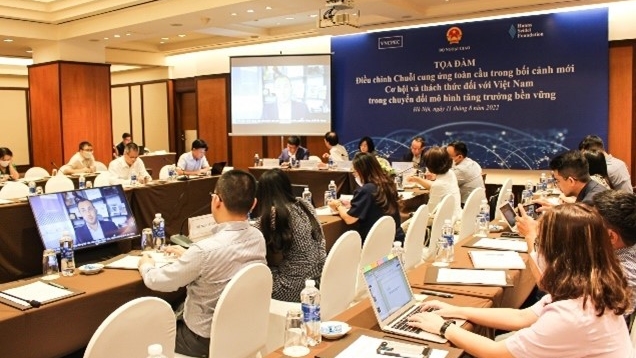Enhancing Vietnam’s supply chain capability
Dialogue on Reshaping Global Supply Chain in the New Normal: Opportunities and Challenges for Vietnam in Transitioning Towards a Sustainable Growth Model
Representatives of MOFA, VNCPEC, and the speakers at the dialogue
HSF
Around 50 economic experts, representative of business associations and government agencies attended the dialogue to discuss opportunities and challenges of Vietnamese businesses participating in global supply chains. Furthermore, policies and strategies for strengthening Vietnam's economic institutions were thoroughly debated for the sake of improving the business environment as well as Vietnamese enterprises’ ability to manage risks and competitiveness.
In his opening remarks, Mr Michael Siegner – Resident Representative of HSF Vietnam highlighted that there are limits and challenges to what a country can do on its own in the global supply chains. Relying entirely on domestic production to serve domestic consumption fails if the production is closed by sudden events like the pandemic or consequences of global warming. In agreement with Mr. Siegner, Dr Can Van Luc, a VNCPEC representative, mentioned the need to shift supply chains toward green and digital economies.
Mr Michael Siegner – Resident Representative of HSF Vietnam delivered his opening remark via video
HSF
Another topic that came up during the discussion was the capabilities of Vietnamese businesses. According to Ms. Tran Bao Ngoc, Director-General, Department of Multilateral Economic Cooperation, MoFA, the majority of businesses have limited competitive power and risk management capabilities. Although approximately 56% of local businesses are involved in supply chains of different levels, only about 4% are capable of competing proactively with foreign businesses. In light of this, participants at the dialogue discussed and analysed critically relevant policies and strategies in order to boost the capacities of the local businesses.


